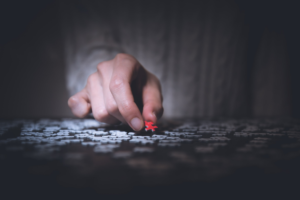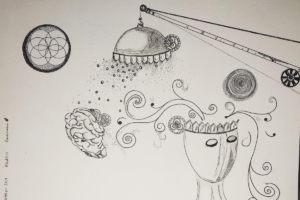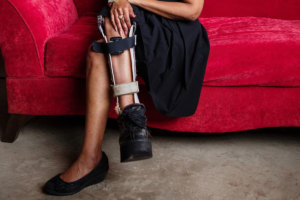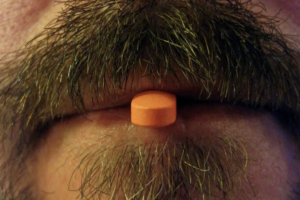December 21, 2019
NOTE & CONTEXT (from the Author): I thought that diagnoses were intended to help those of us in need, by providing resources, support, and proper health care. My experiences, though, suggest the opposite. These labels overshadow a person’s true identity; they can become dehumanizing; they can actually prevent a person from accessing resources, places, and activities that might otherwise be most helpful. Most prevalent among mental health diagnoses, the associated stigma that accompanies the use of medical labels is beyond detrimental – it can actually prevent the healing from occurring, itself. I wrote the poem below in a flurry of anger felt toward this stigma and the lack of support I have battled to make sense of for most of my adult life. Ignorance and bias in not only the general population but also within healthcare, makes it hard to feel safe and supported. The words and actions of others have and continue to impact my ever-changing self-perceptions, which hinge on the incongruent ideas of what these diagnoses mean to others. A diagnosis can be frightening but, also, a relief. My experiences suggest that it’s a complicated mixture of both…
While a list of the diagnoses seen atop my medical charts follows my signature line, I would like to explain three of them now, as the healthcare practitioners assigning them didn’t know much more than I did at the time of diagnosis. Thanks to my own research, here is what I’d like to offer as context:
C-PTSD
I was first diagnosed with PTSD back in 1989, when I was 18 years old. Back then, health care practitioners had even less of an understanding as to what this actually meant and how best to treat the whole person. I had a particularly complicated form of the condition and the treatments that they offered then were useless to me. Fortunately, in the last 6 years there has been a surge in public interest on the topic of trauma; more funding, published research for me to read, and the development of empirically supported treatment protocols for me to explore. Scientists and doctors understand the brain better and how trauma affects it. Most seem to agree that PTSD results in a lot of sub-type illnesses (AKA comorbid conditions) and that is a there is a dynamic range to them. Some specialists (but not all) now acknowledge the resultant diagnoses of anxiety disorders, depression, eating disorders, chronic suicidal tendencies, and insomnia. Some understand that physical conditions result, too, like (for me) heart palpitations & tremors, albeit there are many more likely candidates.
C-PTSD (C for ‘Complex’) was added to the DSMV-5 only this year, which gives voice (finally) to the complexity of conditions resultant from exposure to long-term abuse. Not at all specific to soldiers and persons living in warzones, but a condition that can result from sustained &/or repeated exposure to all sorts of trauma (big T and small t-types). This is the dynamic difference between PTSD and C-PTSD: There exists long-term, repeated trauma that creates complexity in mind-body states and given that each individual is entirely unique, the symptoms can manifest very differently in each of us…
D.I.D. (AKA Dissociative Identity Disorder, previously known as Multiple Personality Disorder)
I also carry a diagnosis of DID, whose previous name continues to elicit images of mass murderers, serial killers, people to fear in the minds of most – thanks to movies like Sybil that undermines the curiosity and compassion necessary for an evolved understanding of this delicate condition. Today, most trauma-informed interventionists agree that people with DID were likely traumatized as young children to a point whereby the condition evolved as a means of coping – as a means (for some) of mere survival. Yet, this is new age knowledge and most Americans continue to operate in states of ignorance and out of fear, which breed’s hatred, contempt and biases. Let it be known that many of us lead successful, productive lives with careers and families; operating alongside everyone else. Like me: I have four children and was a Montessori Educator for 20 years. But, unlike most of you, we had childhood trauma and it caused our brains to develop differently – to think differently, too. The trauma that I endured interrupted my development, so my brain did what it needed to do to adapt and to survive. I have a legitimate brain injury as a result of prolonged exposure to trauma. I have different modes of consciousness and emotional reactivity – my thinking process is likely and largely different than yours once I’ve entered into a different ‘dissociative’ frame of mind. I have “spaces “ in my thoughts and in my memories. Functioning as an adult is challenging in these moments, since I am literally thinking like a child – stuck in a developmental state of mind and body. I even write with different handwriting when in these different mind states.
There are statistics and logistics to consider: Only some 20% of people who experience trauma, end up with a diagnosis of PTSD. Twice as many females than males are diagnosed. Doctors don’t know why. Only about 1% are believed to develop DID, but I personally believe it’s more than this because it’s very difficult to identify. Meditation can help. For me, it connects my mind states and retains memory. I also use sticky notes to track myself on a daily basis and make sure I am recalling things. I often admit to having a “fuzzy” memory.
Some people experience complete disconnection or separation from these respective mind states, which makes it impossible to remember what they did in one mind state when operating in a different one. I had complete amnesia about most of my childhood (and respective trauma) for 30 years. It took me a long time to realize that this wasn’t “normal”. Traumatic events experienced in adulthood, however, triggered my brain to recall much of it through what most might call ‘Flashbacks’. I called them “Time Travels” before I knew the term. During this period of my life, I suffered two years of chronic suicidal depression, insomnia, and constant dissociative issues. I am relieved to say I have healed enough – at this point in my life – through trauma therapy to not have suicidal ideations or daily flashbacks, now.
There’s nothing wrong with my personality or a flaw in my identity – or in my identities (plural). My core is not wrong, and I am not a danger to society, nor am I harmful to others. I don’t walk around in a constant state of psychosis, although I have experienced psychosis before. I am not without intelligence, even though I don’t always have connected thoughts or sequential memory. How I think and who I am should matter, just as someone’s diagnosed illness (like diabetes, cancer, heart disease) – matters. Mental illnesses shouldn’t be separated from physical illnesses in the way that we trend towards doing. Your brain and body are intimately connected with one another, which is why my mental health conditions affect my physical health directly. It is my goal to hold my mental & physical health states out in front of me – like a sphere, where I can continue to see my whole self from all angles and perspectives. This is the key ingredient to living in peace with it all…
FIBROMYALGIA
Fibromyalgia is another very complicated disease with which I live. It has no cure and its cause is largely unknown. People of ANY AGE can acquire it – even children, yet many doctors don’t know anything about it and some (even) refuse to acknowledge its existence! My own doctor doesn’t know what to do to help manage symptoms. She suggests a lot of things and has me taking pain medication, but there’s not a lot of information out there beyond pain management; and pain is only a small part of the actualized condition. It’s not an arthritic condition (although I have that too, which complicates all things in discussion). Many doctors seem to think that it’s an arthritis-related condition, but I’d like to argue otherwise: It’s a neurological illness that directly impacts the nervous system and causes widespread nerve-pain. Some doctors believe it has to do with swelling or inflammation in certain parts of the brain, which may be why it impacts so many things: The body’s ability to regulate temperature; energy levels (causing fatigue); sensory issues; problems with balance (so much so that I was tested for MS at one point); muscle weakness; disruption to executive functioning (attention & memory); swelling all-over; burning sensations and other inexplicable skin pain. It gets in the way of the brain’s ability to recognize pain. It impacts the internal organs, also, making my insides feel “bruised”. The condition impacts my ability to work, to go out, and to be able to do things so many others take for granted. Its symptoms are impacted by the weather, stress, and other environmental factors so go figure – it’s never the same and always changing… Just as with all chronic conditions, Fibromyalgia impacts the whole person and (inevitably) their families and friends. Compassion and patience are necessary ingredients, which is why I offer this insight AND this heartfelt poetic letter – in the name of justice:
Dear Diagnosis
stealing away my hopes and dreams
a necrosis
on my everyday things
should this be a letter to the C-PTSD?
Fibromyalgia or Anxiety?
hey
maybe it’s to Depression
a soul sucking life draining infection
nobody can see
or
maybe it’s to D.I.D
fractured personalities
woven in complexities
Dear Diagnosis
stealing away my hopes and dreams
a necrosis
on my everyday things
What’s the point for you Diagnosis?
weren’t you supposed to help?
give resources ?
yet ….. you are soulless, ruthless
a dead prognosis
with endless medication doses
you wrap me in red stigma
chronic suicidality a magma
of heat bubbling with the complex grief
locked bars of agoraphobia on the windows
and doors…..
sometimes it’s a fucking war
against pain
inside and out
fuck you
dear Diagnosis
fuck you
did you give me any assistance?
or did you take away my existence?
which one of you should I scream at?
for taking my dreams and
exchanging it with wrath?
how about arthritis in several different forms
my spine slowly turning around deformed
how about chronic fatigue
a vampire sucking me weak
no more running
no more swimming
no more biking
no more trying
Dear Diagnosis
stealing away my hopes and dreams
a necrosis
on my everyday things
God forbid anyone know your many names
for oh….then they look at me and refrain
from seeing me anymore
I’m invisible
wearing only your acronyms for clothes
their own biases clouding their eyes
my name dies
on their lips …..
a discrimination
a disintegration
an elimination
of my voice
of my face
identity destroyed
fuck you
dear Diagnosis
fuck you
what is your ambition?
I think maybe to oppress women
maybe men too ….fuck you, fuck you
a fucking prescription to addiction
I’m to blame for
shame on my conditions
shame
shame
Dear Diagnosis
stealing away my hopes and dreams
a necrosis
on my everyday things
there no petition to chronic illnesses
the doctors & therapists
have no remedy for
just diagnosis
with no cure to explore
the doctor said once “you just need
physical therapy, herbal tea, maybe psychotherapy”…”here take these pills”
in between these appointments
I slide the hill of entropy
said her solution of the illness algebra
is just for me to somehow
“get some stamina”?
and don’t forget
oh the lovely medication side effects
of diarreah pain
a lost and foggy brain
all the energy drained
vomiting up her words while I shake
chaos smoldering in my wake
your kidding, right?
gimme a fucking break
happiness amputated
freedom barricaded
future eradicated
what have you done for me Diagnosis ?
what exactly ?
everyone said you would help
it’s written down in a sticky note somewhere
was I supposed to gain some insight to the plights?
gone is my career
friends walked out the door
I’m a burden to my family
so, I sit here with you
diagnosis, my
Dear Diagnosis
master thief of hopes and dreams
a necrosis
on my everyday things
Female, 47 y/o
C-PTSD: Complex- Post Traumatic Stress Disorder; D.I.D: Dissociative Identity Disorder; Anxiety: Social, Agoraphobic; Generalized Depression: Major & Treatment Resistant; Fibromyalgia; Psoriatic Arthritis; Osteoarthritis; Hearing Impaired








